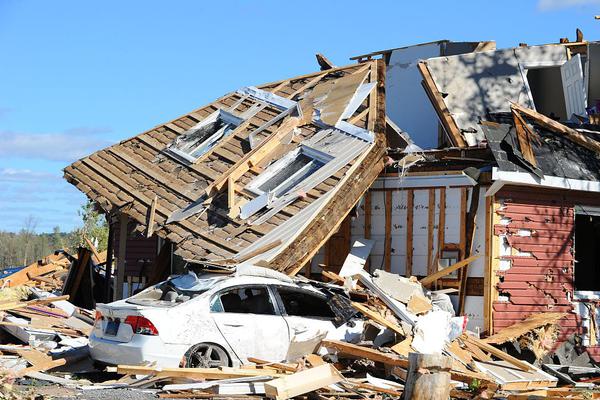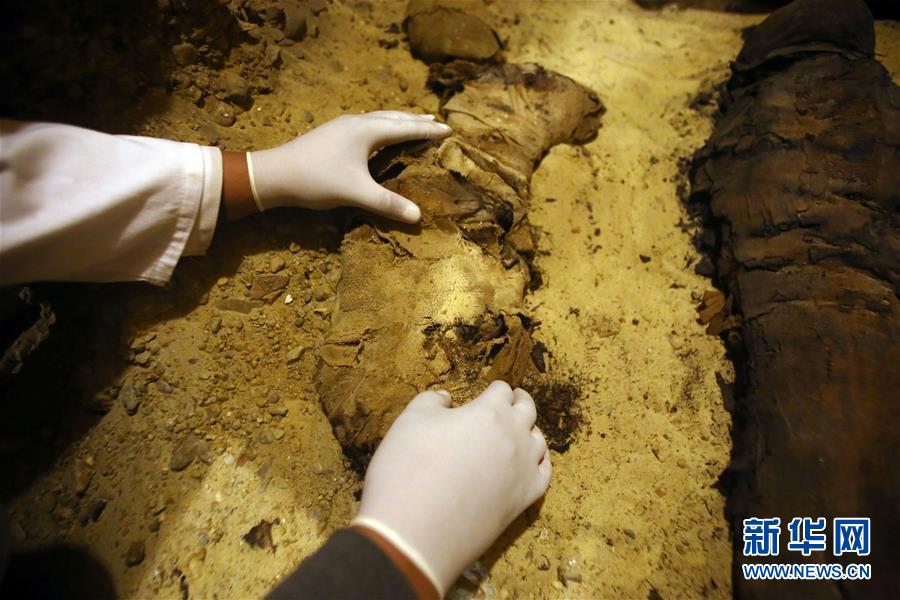Britain's political separation from the European Union officially began last week. But the island's original split from mainland Europe actually happened hundreds of thousands of years ago.
Researchers have Taiwana new theory for how this prehistoric "Brexit" likely went down: first with an overflowing glacial lake, and later with a catastrophic flood.
If it wasn't for this set of geological circumstances, Britain may have remained connected to mainland Europe, jutting out into the North Sea like Denmark does today, according to a study published Wednesday in Nature Communications.
SEE ALSO: Theresa May signing Brexit letter is the meme you've been waiting for"Without this dramatic breaching, Britain would still be a part of Europe," Sanjeev Gupta, a co-author of the study and Earth sciences professor at Imperial College London, said in a news release.
"This is Brexit 1.0 -- the Brexit nobody voted for," he said.
 Original image has been replaced. Credit: Mashable
Original image has been replaced. Credit: Mashable Gupta and his colleagues used high-resolution seafloor data and 3-D modeling to explore how the land bridge once linking Britain and Europe likely collapsed.
Previous research suggested that a glacial lake spilled over and formed the Dover Strait, which is now the narrowest part of the English Channel. But this new study suggests the split happened in two distinct stages.
The first separation event likely occurred some 450,000 years ago, when Britain and continental Europe were still connected via a chalk ridge that stretched from southeast England to northwest France. At that time, vast swaths of ice blanketed the North Sea from Britain to Scandinavia, and the entire English Channel was an expansive, frozen tundra, criss-crossed by small rivers.
 Original image has been replaced. Credit: Mashable
Original image has been replaced. Credit: Mashable At some point, a glacial lake likely spilled over and caused the initial erosion. Waterfalls cut through the land bridge and caused a rock dam to fall, releasing a fire-hose of lake water into the English Channel, the scientists found in their analysis.
"It would have been a cold world, dotted with waterfalls plunging over the iconic white chalk escarpment that we see today in the White Cliffs of Dover," Jenny Collier, a study co-author from Imperial College London, said in the press release.
Hundreds of thousands of years after that initial event -- probably around 160,000 years ago -- the chalk ridge likely experienced a "catastrophic failure," triggering a mega-flood that completed the split between Britain and mainland Europe, the scientists found, based largely on coastal sediment records.
 Original image has been replaced. Credit: Mashable
Original image has been replaced. Credit: Mashable Collier said it's still not clear why the glacial lake initially spilled over, or why the chalk bridge was finally breached, though the latter might be due to an earthquake. The team also hasn't yet developed an exact timeline for these events.
Still, Gupta said the geological split between present-day Dover, England, and Calais, France, was "undeniably one of the most important events in British history."
"When the ice age ended and sea levels rose, flooding the valley floor for good, Britain lost its physical connection to the mainland," he said, noting that the split has helped "to shape our island nation's identity even today."
In other words, without the first, geological Brexit, the current one may never have happened.
(Editor: {typename type="name"/})
 Best MacBook deal: Save $200 on 2024 M3 MacBook Air
Best MacBook deal: Save $200 on 2024 M3 MacBook Air
 The Women's Strike fizzled because Americans can't stop working
The Women's Strike fizzled because Americans can't stop working
 AT&T announces new prepaid GoPhone unlimited data plan
AT&T announces new prepaid GoPhone unlimited data plan
 MashTalk: Did WikiLeaks just do Apple and Google a huge favor?
MashTalk: Did WikiLeaks just do Apple and Google a huge favor?
 AI models don’t understand Gen Alpha slang
AI models don’t understand Gen Alpha slang
Nishioka vs. Alcaraz 2025 livestream: Watch Australian Open for free
 TL;DR:Live stream Nishioka vs. Alcaraz in the 2025 Australian Open for free on 9Now. Access this fre
...[Details]
TL;DR:Live stream Nishioka vs. Alcaraz in the 2025 Australian Open for free on 9Now. Access this fre
...[Details]
Terrence Malick is just embarrassing movie stars with weird sex stuff now
 Terrence Malick apparently isn't making movies anymore, he's making elaborate excuses to put our hot
...[Details]
Terrence Malick apparently isn't making movies anymore, he's making elaborate excuses to put our hot
...[Details]
It's Saturday night and 75,000 people are watching the giraffe livestream
 Let's get this out of the way first. No, April the giraffe hasn't given birth to her calf yet. Howev
...[Details]
Let's get this out of the way first. No, April the giraffe hasn't given birth to her calf yet. Howev
...[Details]
AT&T announces new prepaid GoPhone unlimited data plan
 AT&T announced Friday it will offer an unlimited data option for its contract-free GoPhone users
...[Details]
AT&T announced Friday it will offer an unlimited data option for its contract-free GoPhone users
...[Details]
CES 2025: How to buy (and save $390 on) the Dreame X50 Ultra robot vacuum
 PRE-ORDER AND SAVE $390:Ahead of its Feb. 14 launch, the Dreame X50 Ultra robot vacuum announced at
...[Details]
PRE-ORDER AND SAVE $390:Ahead of its Feb. 14 launch, the Dreame X50 Ultra robot vacuum announced at
...[Details]
These cute robotic cat ears will nag you to fix your bad posture
 Good posture makes you stand taller, breathe better, and will save you from looking like the Hunchba
...[Details]
Good posture makes you stand taller, breathe better, and will save you from looking like the Hunchba
...[Details]
There's now a 'She persisted' energy bar because this is what we've come to
 American progressives now face a nearly insurmountable task: Manage one of the largest social protes
...[Details]
American progressives now face a nearly insurmountable task: Manage one of the largest social protes
...[Details]
PSA: The new 'Beauty and the Beast' soundtrack is streaming on Spotify
 There may be something on Spotify that wasn't there before... and by "something," we mean the brand-
...[Details]
There may be something on Spotify that wasn't there before... and by "something," we mean the brand-
...[Details]
NYT Connections hints and answers for January 16: Tips to solve 'Connections' #585.
 Connectionsis the one of the most popular New York Times word games that's captured the public's att
...[Details]
Connectionsis the one of the most popular New York Times word games that's captured the public's att
...[Details]
Frank Ocean has a brand new solo track and – sorry, we just need a minute
 Looks like we don't have to wait four years for new tracks from Frank Ocean.The artist debuted a new
...[Details]
Looks like we don't have to wait four years for new tracks from Frank Ocean.The artist debuted a new
...[Details]
Best MacBook deal: Save $200 on 2024 M3 MacBook Air

Commuters call out 'sexist' ad, brand brings on the extreme sarcasm

接受PR>=1、BR>=1,流量相当,内容相关类链接。